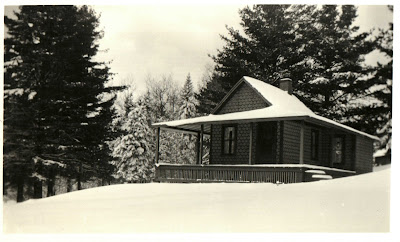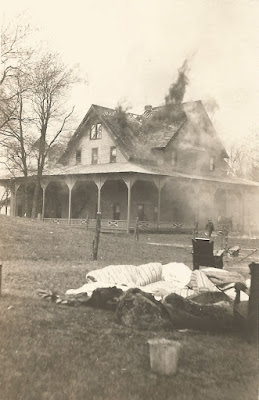Don Thompson Remembers
Donald Kempton Thompson was born ninety years ago on October 20, 1934. He is the sole living member of the third generation of the Beaver River Thompson family. His paternal grandparents, William and Hattie Thompson, moved to the Beaver River country to operate a sportsman’s hotel in 1911 [see my post of 6/2/21]. That’s Hattie Thompson with most of her grandchildren in the photo above. Don is not in that picture because he had not been born yet. Don’s maternal grandparents were Will Kempton [see my post of 8/27/23] and Etta Wagner Kempton [see post of 8/17/23]. We know a great deal about Etta and Will because of the survival of Etta’s remarkable daily journal.
Don’s parents were Walter Thompson and Gladys Kempton. Walter was the oldest son of Hattie and William Thompson. Walter’s brother Clinton is the grandfather of the three brothers of the fifth generation of the Thompson family that now operates the Norridgewock [see my post of 10/20/22]. Gladys Kempton, Don’s mother, was the only child of Etta and Will Kempton. I previously wrote an article about Gladys as a teenager based on Etta’s journal [see my post of 10/28/23]. That article ends with Gladys and Walter getting married on May 18, 1918.
Last fall my wife Merry and I traveled to Cambridge, NY near the Vermont border to meet Don and his wife Nancy. They invited me to visit after reading my articles about Don’s ancestors. I was excited to meet Don because I hoped to discover new things about the history of the Thompson family. Our two-and-a-half-hour conversation was wide-ranging. Don’s memory is quite clear. He enjoyed talking about his family and his memories of Beaver River as we sat around the kitchen table.
One of the things he brought up early in our talk was the mystery of why he was born where he was born. His mother told him that he was born in Crystaldale, NY. Don had always assumed that was because his parents had to stop there as they were hurrying down the Number Four Road to the hospital in Lowville. I was able to tell him that he was born there because that was where his grandmother Hattie was living at the time. The Lowville newspaper reported that he and his mother Gladys stayed on at his grandmother’s house for almost a month after his birth before returning to Beaver River.
Don is quite proud of his Kempton / Thompson heritage. He has collected and preserved many family keepsakes. He got out a box to show me part of his collection of postcards, letters, photos, and an old quarter wrapped in a piece of paper with a note in Etta’s handwriting. He also showed me one of the original volumes of Etta’s journal. He invited me to step into the living room with Nancy where she pointed out the large, elaborate framed nineteenth century marriage certificate of Don’s maternal grandparents, William Kempton and Etta Wagner.
Most of the rest of our conversation focused on the history of Don’s family beginning with his parent’s marriage in 1918. For the first few years of their marriage, Gladys and Walter lived in the railroad section house with Gladys’ parents, Etta and Will. That house got a little bit crowded when their first two sons, Arthur [b. 04/08/1919] and Leslie [b. 03/19/1921] arrived. Here are the happy parents with Arthur, nicknamed Bud.
Sometime in 1921 or 1922 Gladys and Walter and their two young sons moved into the owner’s quarters in the Norridgewock II hotel. Walter and Clint Thompson bought the second Norridgewock hotel from Tupper Lake businessman Peter Propp about 1921. Propp had financed construction of the hotel in 1915 after the original Norridgewock burned down [see my post of 07/13/22]. While living in and running a very busy hotel Gladys and Walter had two daughters, Grace [b. 2/7/1923] and Edna [b. 8/24/1924].
Also, about 1921 Etta and Will Kempton bought a cottage lot in Beaver River and built their own camp. They named it “The Pines.” Etta and Will lived there from the mid-1920s until they retired in 1939. It was located on a small hill right behind the section house. Don and Nancy keep this photograph of “The Pines” in the living room.
In 1924 the Thompson brothers built the hotel Annex across the Grassy Point Road on the site of the original Norridgewock Hotel. The Annex had a general store and post office on the ground floor. Walter, Gladys, and their children lived upstairs. Don remembers that the local school sometimes met downstairs. The family lived there for fifteen years until 1939. During this time, Walter and Gladys had two more sons, Lyle [b. 11/17/1930] and Don [b. 10/20/1934]. As most Beaver River camp owners know, the shell of the old Annex still stands.
In 1939 Walter sold his share in the Thompson Brother’s enterprises to his brother Clinton. By this time, the brothers owned the hotel, the saloon, the store, and almost all the private property not already sold for camps. I asked Don if he knew why his father decided to move away from the place that he had called home for so long. Unfortunately, he never learned the reason. After all, he was only five years old when the family relocated.
The family initially moved to Fort Edward, NY where they rented a small hotel. Gladys operated that modest place. The family that now included six children lived in the hotel. This was apparently intended to be a temporary arrangement while Walter established his own pulp wood business, cutting trees on leased land in nearby Vermont. Walter ran the logging business and also worked in the woods with his loggers. Don’s primary childhood memory of his father, Walter, was that he was a hard worker who worked all the time. His primary memory of Gladys, his mother, was that she was totally devoted to her family, always kind and gentle.
Walter’s new lumber business did well. After living in Ft. Edward for a year, the family was able to move to nearby Cambridge, NY, and Gladys was able to leave the hotel business behind. From 1940 until 1947 the family lived in a number of different rented houses in Cambridge.
It’s probably not a coincidence that Don’s maternal grandparents, Etta and Will Kempton, also moved away from Beaver River in 1939. Will retired from the section foreman’s job on the railroad and Etta retired as the Beaver River postmaster. They built a house in North Bangor, NY, their home town just west of Malone. Don was proud to tell me that his grandparent’s retirement home still stands. That’s it in the photo below. Unfortunately, Will Kempton’s retirement was a short one. He died on Jan. 21, 1943. After his death, Etta moved to Cambridge to live with Gladys, Walter and family.
1946 / 47 was a time of great upheaval for the family. Don’s father Walter died on Jan. 21, 1946. His grandmother Etta Kempton died on April 1, 1946. Don’s two oldest brothers had already left home when they enlisted during the Second World War and later became fighter pilots. Don’s two older sisters, Grace and Edna, both got married in the summer of 1947.
That same year the remaining family members, Gladys, Don and Lyle, moved to the Kempton house in N. Bangor, NY. The house had been vacant ever since 1943 when Etta moved to Cambridge. This was familiar family territory for Gladys. Her uncle Herman lived in nearby Brushton and her aunt Agnes lived a short train ride away in Malone. Gladys herself had attended school in Brushton while living with her grandfather in N. Bangor during the school year. Don was thirteen years old when they moved up north. He went to school in the upstairs of a N. Bangor store.
For every summer from 1948 until 1953 while living in N. Bangor, Gladys, Don and Lyle would move to Beaver River where they lived at the hotel. Gladys worked in the hotel kitchen and the boys did odd jobs around the place. One favorite memory Don has of the summers at Beaver River was that Gladys loved to square dance. He remembered a few times when the Sleepy Hollow boys would play for dances at the hotel saloon. He also remembered that when they took the train, Gladys would amaze the boys by reciting the telegraph messages she overheard in the stations. She never forgot the Morse code she learned as a teenager when she worked for a while as a railroad telegraph operator.
Predictably, many of Don’s memories from those summers involve the railroad. Although railroad activity was starting to decline, it was still quite active. The original station building had burned to the ground in October 1940, so during the years Don remembers, the old section gang bunkhouse served as the station. The section gang lived in the house that the railroad built for Will and Etta back in the fall of 1915. That building still stands along the tracks close to the road crossing. Don remembers that the section gang stayed in Beaver River during the week but went home, usually to Utica, on the weekends.
Although the railroad was starting to use diesel locomotives, they still had plenty of steam engines in service. Because they needed to frequently take on water, the water tank right next to the section house was still in regular use. Teenagers, including Don and his brother Lyle, would climb to the top of the water tank for fun. Don remembers a couple of times that he got the job of filling the water tank when it ran low. “We used to fill it by going up the tracks to where there was a valve on the pipe coming down from the gravity dam on the West Branch. We had a six-foot, heavy handle, tee on the bottom sort of thing to open the valve and let water into the tank.”
Another little task Don and the other teens living at Beaver River enjoyed was flagging down the midnight train, known as the Number Four. “Once in a great while, someone would go out on the Number Four, so you had to light the lantern and stand down by the station and wave the lantern at the engineer. The train went toot, toot and it would stop.”
Don’s uncle, Clint Thompson ran the post office, then located on the ground floor of the Norridgewock with its own entrance. The mail came in and went out on the train in a sturdy mail bag. If the mail train was scheduled to stop, there was no problem. It was easy to just throw the mail bag on board. If the train was not scheduled to stop, it was necessary to hang the bag on an arm over the track where someone on board could snag it. His uncle often recruited kids to climb up to hang the mailbag. Here’s a picture of Don’s grandfather Will Kempton clowning around when hanging a mail bag.
Don visited Beaver River occasionally after 1953 and he kept in touch with it as life rolled on with work, marriage and children. He moved back to Cambridge, his home town, and bought the house where we had our conversation. Ten years ago, his wife Nancy arranged a family reunion at Beaver River for Don’s 80thbirthday. Everybody stayed in the old hotel and had a grand old time.
Sources: my interview with Don Thompson 10/2/23, and Mary Kunzler-Larmann interview with Don Thompson July 2015. Photos from Don Thompson’s collection.









Comments
Post a Comment